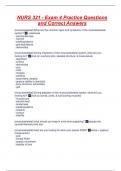Exam (elaborations)
NURS 321 - Exam 4 Practice Questions and Correct Answers
- Course
- Institution
[musculoskeletal] What are the common signs and symptoms of the musculoskeletal system? - weakness - pain/tenderness - warmth - swelling/edema - gait disturbance - deformities [musculoskeletal] During inspection of the musculoskeletal system, what are you looking for? (look at: overlying skin, ske...
[Show more]



